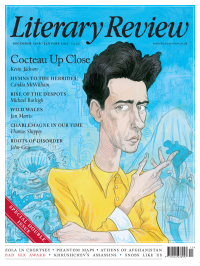Laura Gallagher
Guilty Until Proven Innocent
Little Deaths
By Emma Flint
Picador 311pp £12.99
One morning in New York in July 1965, in ‘a quiet neighbourhood, not the kind of place where kids went missing’, a 26-year-old cocktail waitress telephoned her estranged husband demanding to know if he’d taken the children, who’d disappeared from their bedroom overnight. He denied doing anything of the kind; eventually the children were found dead. The lead detective rapidly surmised, from the mother’s carefully made-up face and figure-hugging clothes (she didn’t ‘look how a woman should look when her kids go missing’), as well as from evidence that she drank and enjoyed a varied sex life, that she was the only likely suspect. This proved sufficient evidence for the media, the public and finally, along with doubtful allegations made belatedly by an ex-lover and a neighbour, for a jury as well. The father, deemed to be appropriately distressed, moral and ‘a little slow’, never came under serious suspicion, despite discrepancies in his statement. In the absence of conclusive evidence, the young woman was convicted on the basis of her character.
This is the framework that Emma Flint’s debut appropriates from the Alice Crimmins case, one that has inspired several writers already. Flint’s protagonist, Ruth Malone, keeps – among other trappings – Crimmins’s hair colour, nickname (‘Rusty’) and the prodigious sex appeal that incited so much fascinated resentment among the

Sign Up to our newsletter
Receive free articles, highlights from the archive, news, details of prizes, and much more.@Lit_Review
Follow Literary Review on Twitter
Twitter Feed
It wasn’t until 1825 that Pepys’s diary became available for the first time. How it was eventually decrypted and published is a story of subterfuge and duplicity.
Kate Loveman tells the tale.
Kate Loveman - Publishing Pepys
Kate Loveman: Publishing Pepys
literaryreview.co.uk
Arthur Christopher Benson was a pillar of the Edwardian establishment. He was supremely well connected. As his newly published diaries reveal, he was also riotously indiscreet.
Piers Brendon compares Benson’s journals to others from the 20th century.
Piers Brendon - Land of Dopes & Tories
Piers Brendon: Land of Dopes & Tories - The Benson Diaries: Selections from the Diary of Arthur Christopher Benson by Eamon Duffy & Ronald Hyam (edd)
literaryreview.co.uk
Of the siblings Gwen and Augustus John, it is Augustus who has commanded most attention from collectors and connoisseurs.
Was he really the finer artist, asks Tanya Harrod, or is it time Gwen emerged from her brother’s shadow?
Tanya Harrod - Cut from the Same Canvas
Tanya Harrod: Cut from the Same Canvas - Artists, Siblings, Visionaries: The Lives and Loves of Gwen and Augustus John by Judith Mackrell
literaryreview.co.uk